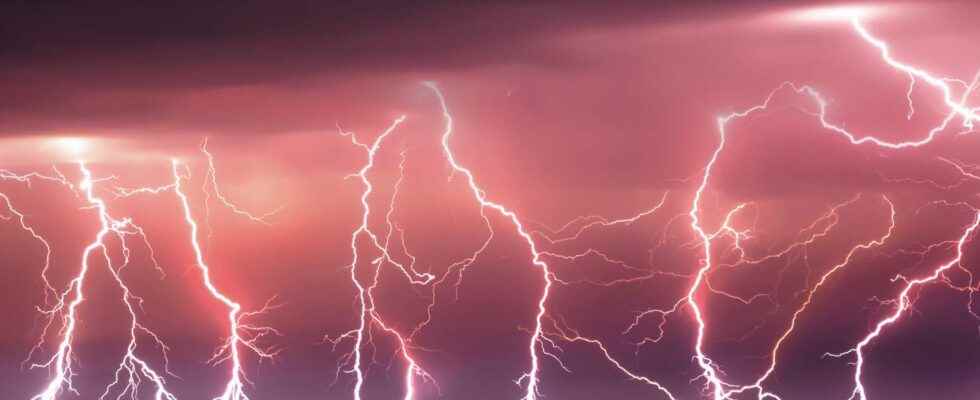Saturday June 4, 2022, Meteo France issued the alert thunderstorms the largest in the history of France: 65 departments in orange vigilance, that is to say 3/4 of the country, never seen before. The hours that followed were indeed marked by one of the biggest storm waves in recent yearswith some supercells, the most violent type of thunderstorm, which generated destructive giant hailstones, stormy winds and torrential rains. An event that occurs immediately after the hottest month of May ever recorded in France, with an excess of 2.7°C over normal. So, are the storms more numerous, and more violent, with the global warming ?
Potentially heavier precipitation under thunderstorms
If there is really no longer any doubt about the link between climate change, heat early and drought, the question of thunderstorms is not so obvious. First of all, storm observation tools are quite recent: lightning, for example, has only been recorded in France since the 2000s, so we do not have enough perspective to be able to draw conclusions on their evolution. . Regarding the risk of torrential precipitation, the answer is clearer: at the global level, for each degree gained, precipitation intensifies by 7%. Global warming modifies the conditions for the formation of solar systems. weather report, like thunderstorms. More the climate warms, the more evaporation there is, and in this context, the precipitation associated with thunderstorms will intensify, according to the latest IPCC report. ” It is a consequence of the increased capacity of theatmosphere close to the surface to contain water vapor and the resulting moisture transport in weather systems ” precise Dr Valerie Masson-Delmotte, co-author of the latest IPCC reports. Heavier rains expected, and potentially more destructive due to rampant urbanization: the concrete of our cities makes the soil impermeable and necessarily increases the risk offloods. And in the countryside, the risk of overflow is also greater if these violent rains fall on dry soil (due to the drought of recent months) or deteriorated (due to theagriculture intensive, from plowing, mowing green spaces or lack of vegetation). The weather creates disasters when violent phenomena mix with bad choices in matter land use planning.
No clear trend on the evolution of hail and tornadoes
With regard to hail, and the giant hailstones that have made the news several times in recent weeks, it is difficult to draw conclusions on a trend: ” in the absence of sufficiently detailed and long-term direct observations, it remains difficult to discern trends (possible changes and frequency or intensity of hail) in the observations. Based on these data, the observed increase in intensity in April-May could be linked to the warming of spring minimum temperatures. The 2021 IPCC report concludes that for almost all regions, there is a low degree of confidence in changes in hail and severe thunderstorms due to a lack of observations, insufficiently homogeneous data, and models. generally not having the resolution precise to represent these phenomena “, according Valerie Masson-Delmotte.
The most violent thunderstorms are not only capable of generating giant hailstones, but also, tornadoes. In France, tornadoes are still poorly identified and their annual number (20 to 50) could in fact be much higher. These are only reported and listed if photographed and filmed, and most occur in the countryside, probably without any witnesses. We should also remember that the impression of seeing more and more tornadoes in France, or in the world, is largely linked to the generalization of smartphones and the use of social networks, which have made it possible to bring these phenomena to the media for several years. In the United States, the country most affected by tornadoes during the season thunderstorms, no increase was observed in connection with global warming. Some researchers, on the other hand, believe that the early heat rather leads to a shift in the tornado season (or even a lengthening), with violent phenomena earlier in the spring, in March.
If the influence of global warming on weather phenomena such as hurricanesheat waves, and heavy rains, is unanimous among the scientific community, the question of thunderstorms has not yet found a clear answer to date.
Interested in what you just read?
